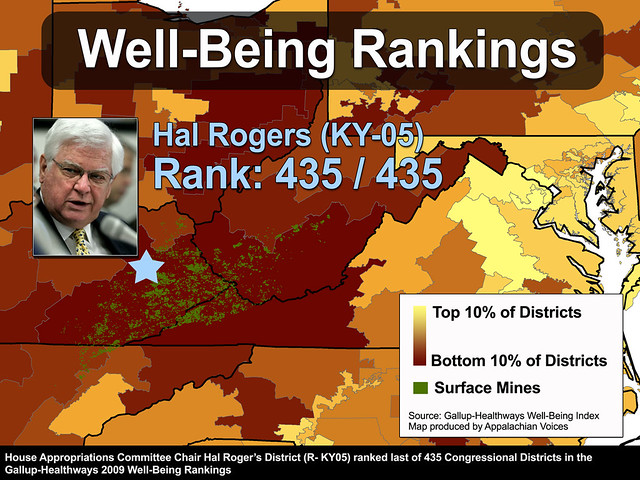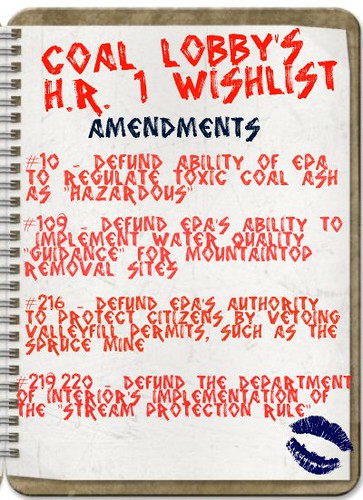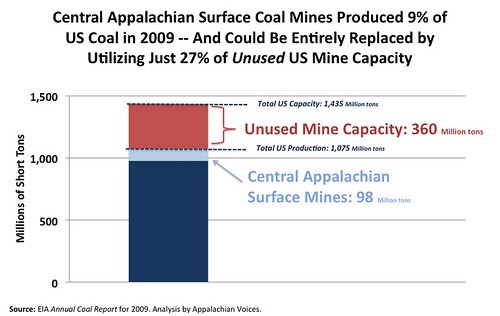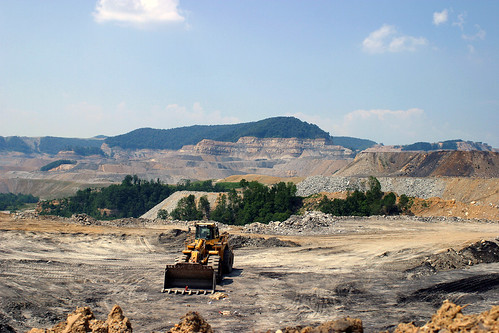Why Americans Should Oppose Rep Hal Rogers’ Federal Budget (HR 1)
Appalachia saw several new threats arise in Congress yesterday, as Representatives of Congress introduced bad amendment after bad amendment after bad amendment to the already dangerous Budget Resolution (H.R. 1) that is due to be voted on as soon as tonight. In all, more than 400 amendments were filed yesterday and an additional 180 have been filed today. Many of them reflected Congressman Hal Rogers’ own sentiments about how to govern – disregarding citizen protections and sound science, while encouraging the complete and utter deregulation of large polluting industries that are a threat to public health and well-being. We’ve seen what happens when Mr. Rogers’ policies are put into place, as they have been in eastern Kentucky for decades.
Of the 435 Congressional districts, Rogers’ district (KY-05) is #1 in mountaintop removal and stream damages by the coal industry. But it is also DEAD LAST in well being.

Hal Rogers’ neighborhood may be “dead first” in mountaintop removal, but out of the 435 congressional districts in the United States, his ranks:
– 435th in life expectancy (dead last)
– 435th in physical health (dead last)
– 435th in overall well-being (dead last)
– 435th in emotional health (dead last)
Kentucky ranks dead last in healthy behavior, and 49th in overall well-being, emotional health, and physical health (behind WV of course). More mountaintop removal will only make these problems with the health of Appalachian people even worse. Its hard to get worse than worst, but Hal Rogers is doing his darndest.
Yesterday the coal lobby added a litany of dangerous amendments to HR 1 that had nothing to do with spending, but instead are aimed at removing citizen protections from mountaintop removal. Here are the particularly bad amendments as they relate to Appalachian Voices’ work.

Amendment #109 (Griffith-R-WV) – This amendment would defund EPA’s authority to implement its recent guidance regarding mountaintop removal, which protects American citizens and Appalachian headwater streams from toxic mountaintop removal mining waste.
Amendment #216 (McKinley-R-WV) – This amendment would defund EPA’s ability to implement its authority under section 404c to veto Clean Water Act permits that presented a threat to public health and well being. The recent veto of the Spruce Mine #1 permit is the most well-known example of this authority, which EPA uses only in extreme circumstances.
Amendments #219/220 (Johnson-R-OH) – These amendments would defund the Department of Interior’s ability to implement its “Stream Protection Rule” (SPR) which is currently being drafted in order to protect our citizens from toxic coal waste.
In addition, Appalachian Voices has written members of Congress opposing Amendments 10 and 217 which seek to defund the regulation of toxic coal ash.
The Obama Administration is hitting back hard, and besides threatening a veto of HR 1 has already put out a backgrounder on the impacts that this bill could have on water quality. Specifically, the Obama Administration said:
The Clean Water Act language is just as irresponsible and reckless.
– The language would prohibit EPA and the Army Corps from preventing the dumping of pollution into waters that flow into the rivers in our communities.– Preventing EPA from improving water quality makes no sense and is particularly irresponsible since we know that every dollar we spend on protecting drinking water yields $27 in health benefits.
– More than 1/3 of the population – 117 million Americans – gets their drinking water from sources fed by waters that may lack protection under the CWA – the CR would make it impossible for EPA to protect those waters and the health of Americans who rely on them.
– The language would prevent EPA and US ACE from agreeing which waters are protected under the law – leaving in place the uncertainty that followed the Rapanos decision
– Finally, the lack of certainty and common-sense this bill would reinforce has led to truly absurd and harmful outcomes.
I’d highly recommend that folks read EPA’s “Budget in Brief” report, outlining the Obama Administration’s plans for budgeting EPA. Even the Administration seeks to cut EPA’s budget 1.3 billion dollars from its operating budget for the last two years, meaning a loss of at least 200 full-time employees.
While the coal lobby is hard at work locking down their supporters in the Senate, Senate Appropriations Committee Chairman Daniel Inouye is indicating he thinks that these proposals are dead in the water in the Senate:
“It is clear from this proposal that House Republicans are committed to pursuing an ineffective approach to deficit reduction that attempts to balance the budget on the back of domestic discretionary investments, which constitute only a small percentage of overall federal spending. The priorities identified in this proposal for some of the largest cuts ‘ environmental protection, healthcare, energy, science and law enforcement ‘ are essential to the current and future well’being of our economy and communities across the country. Such an approach would knock the legs out from under our nascent economic recovery, kill jobs, and do virtually nothing to address the long’term fiscal crisis facing our country. Try as they might to convince the American people otherwise, it is simply not possible to balance the budget by targeting 15 percent of federal spending ‘ no matter how deep the cuts are.
But why is it so important that we stand up and oppose rolling back citizen protections that could streamline and deregulate mountaintop removal?
Here is an example of the water running through Congressman Morgan Griffith’s district in beautiful southwestern Virginia. As a result of mountaintop removal mining, more than 2000 miles of headwater streams in Appalachia have been buried. As you can see, this horrible water containing arsenic, lead, mercury, selenium, and a host of other heavy metals and chemicals not only affects the incredible Appalachian ecosystems, but it also directly impacts tap water.


The impact of rules such as EPA’s guidance are simply to ensure that a greater proportion of US coal production comes from mines that do not pollute streams. Regulations are not what are driving Appalachian coal production downward. Coal demand in the US has plummeted over the past two years. In the mean time, the US mining industry is operating at an anemic 75% capacity. In fact, the production from all Central Appalachian surface mines could be replaced if other coal producing regions were operating at 82% capacity instead of 75%.
There are many ways to reduce wasteful spending in an environmentally responsible manner, and campaigns like Green Scissors or reports from groups like Friends of the Earth have attempted to identify ways to limit wasteful federal spending that is harmful for the environment and the people who live in it. While top EIA brass admit that there is no government count of fossil fuel subsidies, many legislators beholden to the coal lobby are using the budget to attempt political theatre unrelated to federal spending, the debt, or the deficit.
Its clear that coal industry doesn’t like to pay its fair share when it could just outsource the impacts of mining onto the backs of Appalachian communities and America’s taxpayers. A new post at CoalTattoo outlinesThe average American pays a higher tax rate than the coal industry.
President Obama does support cutting $418 million from the Office of Fossil Energy, cutting more than $2.6 billion in coal subsidies over the course of the next decade, and putting $8 billion towards the growing clean energy sector. These are all good things. We have all had to make tough decisions regarding our finances in the last two years. Our Representatives in Congress have difficult decisions to make. But one thing is clear.
They must OPPOSE amendments 10, 109, 216, 217, 219, and 220 and look at supporting initiatives that protect public health and well-being such as clean energy investment. Oppose HR 1. After all, we know where Hal Rogers’ leadership would take us.





 1) Check out the
1) Check out the 
 In 2002 the coal lobby got themselves a special carveout when – without Congressional approval – the Bush Administration rewrote the regulatory definition of “fill material” to include the toxic waste that comes from mountaintop removal sites. The “valleyfills” associated with mountaintop removal sites have buried and polluted more than 2000 miles of headwater streams with arsenic, lead, mercury, chromium, selenium, cadmium and a whole host of toxic heavy metals and chemicals. The states that have been
In 2002 the coal lobby got themselves a special carveout when – without Congressional approval – the Bush Administration rewrote the regulatory definition of “fill material” to include the toxic waste that comes from mountaintop removal sites. The “valleyfills” associated with mountaintop removal sites have buried and polluted more than 2000 miles of headwater streams with arsenic, lead, mercury, chromium, selenium, cadmium and a whole host of toxic heavy metals and chemicals. The states that have been 


 2010 will long be remembered for the horrific disaster at Massey Energy’s Upper Big Branch mine, after an explosion killed 29 men and set off a firestorm in Appalachia and in Washington, D.C. over the safety of America’s coal miners. However, we must remember that there were an additional 42 mine fatalities that received less attention, but had just as tragic an impact on the friends, family, and community of all those involved. In all, these 71 US coal mining fatalities in 2010 were an enormous increase from recent years, and the challenge of moving that number to zero in the upcoming years looms large on the coal industry, federal regulators, and Appalachian politicians.
2010 will long be remembered for the horrific disaster at Massey Energy’s Upper Big Branch mine, after an explosion killed 29 men and set off a firestorm in Appalachia and in Washington, D.C. over the safety of America’s coal miners. However, we must remember that there were an additional 42 mine fatalities that received less attention, but had just as tragic an impact on the friends, family, and community of all those involved. In all, these 71 US coal mining fatalities in 2010 were an enormous increase from recent years, and the challenge of moving that number to zero in the upcoming years looms large on the coal industry, federal regulators, and Appalachian politicians.